This article originally appeared on the October 1986 issue of SPIN.
Pretty Persuasion
I can't imagine R.E.M. vocalist Michael Stipe trying to sell me a beer.
"Underneath the trains and sky
Mumble mumble she see I
Swim a sea my sister's mud
Mumble Mumble mumble Bud"
It wouldn't work. They wouldn't try to make it work. R.E.M. is an American band, not an AMERICAN BAND. They play rock, not R.O.C.K., like some other bands you might know. They don't try to tattoo Old Glory on your chest. Stipe's lyrics may be ambiguous sometimes, but no politician could ever twist them to fit his youth campaign. R.E.M. jangles, but more important, they don't jingo. For that, I admire them. R.E.M. has integrity. Sometimes I think R.E.M. has a little too much integrity. I like R.E.M….BUT. As Pee Wee Herman says, everybody's got a big but.
South Central Rain (I'm Sorry)
I have my doubts. From their first IRS release, the Chronic Town EP in 1982, to last year's Fables of the Reconstruction/Reconstructions of the Fables LP, I've liked each record of theirs less than the other. The hooks get progressively less consistent as the band matures and favors mood and murk over movement. On early tunes, the songs had a coherence that compensated for Stipe's fragmentary atmospheric sketches. But with Fables, the sound just crumbles.
I won't deny the allure of that tension in R.E.M.'s best work between the rush of the rhythm section, the density of Peter Buck's guitar overdubs, and the tentativeness of Stipe's attack. But Stipe doesn't have much range, either musically or emotionally, and his later deliveries favor a world-weary approach over the appealing hushed boy voice of "Gardening at Night."
Pilgrimage
FREE AIDS WITH EVERY B.J.—TERMINAL SEX, reads the sign on the men's room door in Charlotte, North Carolina, where I am transferring to a flight to Athens. Check out the molded plastic cafeteria; the place is clean. I ask for some of the scrambled eggs and hash browns heated in stainless steel bins, but pass on the grits. The cashier hits me with the first twang of the trip. "How y'all doin' t'day?" she radiates. Many men and women sport spare tires squeezed into polyester blends. I spot a woman with a lacquered B-52s hairdo.
Shaking Through
After an hour delay, I climb into a dinky commuter plane. I sit behind the pilot so I can keep a watch on him. He looks 18. I catch him peeking at a list of things to do before taking off. Before I can finish worrying, we land. I forgot to tell the R.E.M. organization what I look like, but getting off the plane, I notice I'm the only one with a chance in hell of being a rock critic. The guy picking me up, Chris Edwards, with his walrus mustache, is the only one at the Athens airport who could be waiting for a rock critic.
Wendell, Gee!
Chris whisks me to a sunken veggie-bar-slash-ice-cream-parlor, True Confections, where Stipe awaits me. Chris asks how long I will need. Thinking a whole afternoon, I hesitate. "An hour?" he asks. He introduces me to Stipe, who tells Chris, "Pick him up in a half hour." Stipe spends the next five minutes massaging a girl's shoulders, acting very much the regular aloof guy, barely looking at me. "I'm only agreeing to talk to you because I didn't want you to think I'm a snob," he finally says.
[caption id="attachment_id_338519"] 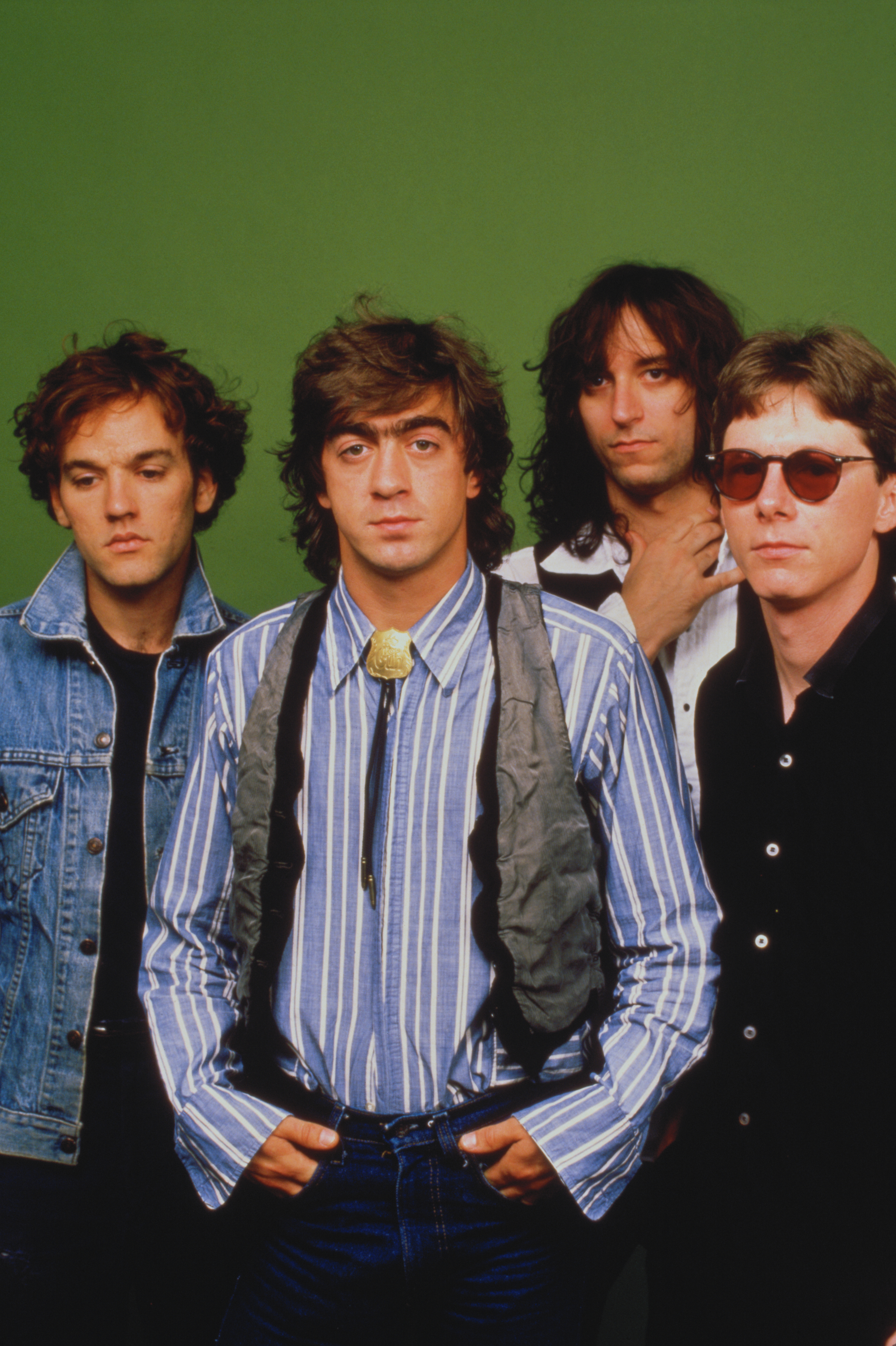 Chris Carroll/Corbis via Getty Images[/caption]
Chris Carroll/Corbis via Getty Images[/caption]
Old Man Kensey
Why do you stay in Athens?
"I was born and raised in Georgia," says Stipe. "This is home. When I fly in from somewhere and I see the tops of the pine trees, I get all lachrymose and weepy. I've got red clay in my blood. I really love hot weather. Humidity is something I thrive on. I become really energetic when it gets stifling."
"Everybody has a place they consider home. It's really just a building or a room. It's really nothing, except to you it offers solace and security. I miss that—just being in one place, being able to wedge myself into the ground a little bit and shake with the wind. Traveling can be really unsettling—no pun intended—unless you're pretty well-centered."
How do you handle it, then?
"I've traveled all my life. [He grew up an army brat.] I'm kind of amazed at how adaptable people are. There are moths that when cities become polluted were able to change their color to blend in with the pollution on buildings. I think people are like that. You can take a person, put them any place in the world, and they're going to be able to adapt to their environment in order to survive. For a long time, I thought there was one place that you had to be, and if you take someone out of their environment they would just wither and die. I don't think like that anymore."
I heard you do sculpture.
"Not really. I guess my house is a sculpture. My bicycle certainly is. [Points to old blue bike in front of us.] No, I don't do sculpture very much. I draw a lot. Most of my drawings are pretty bad, but most people accept them. If nothing else just the sheer volume of them says something. [Catches himself.] I don't go for quantity over quality, but if you don't show them to anybody, then maybe in thirty or forty years you might be able to pick out all the shitty ones, burn them, and keep the rest."
"Without sounding like any kind of—art slob—I like taking pictures and working in a darkroom. I go out and study trees and swim a lot. I ride bikes, paint, draw, sweep, garden, talk to people, write a lot. I like to type as a kind of meditative force. Typing is something that kind of explodes me and scatters me around, and I can sweep back the pieces and I'm a new person."
What do you type?
"Anything at all. Sometimes I take a book and copy it. I have this great old typewriter my mother got for my graduation from high school. It's just a war horse. I once did a drawing of this woman who was naked. It wasn't my mother. It was this beautiful woman, and I happened to draw the name of the typewriter across her torso. So every time I sit down to type—it's a Royal typewriter—I think of this woman."
Stipe interrupts himself and takes off his pair of old beige wraparound sunglasses.
"Does it bother you that I'm wearing these? Sometimes it bothers me to talk to someone wearing sunglasses, and I tell them. Like, 'Hey, you got a booger up your nose.'"
https://youtu.be/lf6vCjtaV1k
You seem to follow the whole punk D.I.Y. philosophy.
"Yeah. Anybody that walks can sing. You just have to get over the feeling of being overheard. Here comes a beautiful girl wearing a T-shirt I made."
How has your life changed?
"It hasn't changed much, except that I'm occupied with a band full-time plus. I don't think in terms of past and present. That's a real American Indian way of thinking. They didn't have any past tenses to their verbs. [Sees a handsome blond man] Hi, howya doin'? [Then to me] That guy always takes his shirt off downtown.
"The pace is so incredibly slow down here, like syrup. The heat has a lot to do with that. Slowness is the most obvious and most intrinsic thing that goes into our music. You can't really express slowness unless you play at a dirge pace, and that doesn't really express it. That just mimics it."
"In the beginning, we were pretty much a thrash band playing pop melodies. Almost all we did was thrash, because we were terrified of playing slow. None of us could play well enough other than to play the fastest song possible. I have always tended to slower-paced music. So I started slowing down my part to compensate for everyone else playing at breakneck speed. And that's how the rhinoceros got its hid." [laughs].
[Then, out of nowhere] "What if the next national fad sport was tree climbing? They would build these spas in New York City where they would have trees shipped in from all around the world. People would be connoisseurs of what kind of tree they would climb."
Where did that come from?
"It was something that hit me last summer. I thought it would be real hilarious to have lessons in tree climbing and particular outfits. And the idea of an entire urban area emptying out on the weekend so that people could run out and climb trees [laughs]."
"I know I'm going to be asked a lot of questions about our new album. I've put a lot into those songs, and I think I've spoken my piece. Now I'm leaving it up to everybody else to take what I've given and expand on it. I really want those songs to be heard. They're colossal. It's the best thing we've ever done."
"Without getting too Zen about it, I think the words that I write are there and the songs are there, and it's just a matter of waiting for the right ones to come together right. And when they do, like on 'Feeling Gravity's Pull' or "Begin the Begin,' then it's transcendent."
"Do you know in Brazil when Robert DeNiro gets swallowed up by all those papers and disappears? That's my life. And I'm just waiting for that moment when I'm going to walk into my bathroom and all the paper around me is going to surround me and I disappear down the toilet. I'm just surrounded by paper, and it's got words all over it. So I pick off whatever gets stuck to my face whenever I cut myself shaving, put it down on the table, and that turns into a song."
What are your religious beliefs?
"That's a hard one. My parents are Christians, and the last thing I'd want to do would be to offend them, 'cause I'm not Christian. On the record, I believe in rocks [laughs]. How's that? Listen to the song 'I Believe.' It's all there. Once I said in an interview that I like turtles, and this guy brought me a fucking turtle in the middle of a tour. Now people will be giving me huge boulders everywhere we play."
"Let's stop before this reaches diminishing returns," he says.
It leaves a bitter taste.
[caption id="attachment_id_338522"] 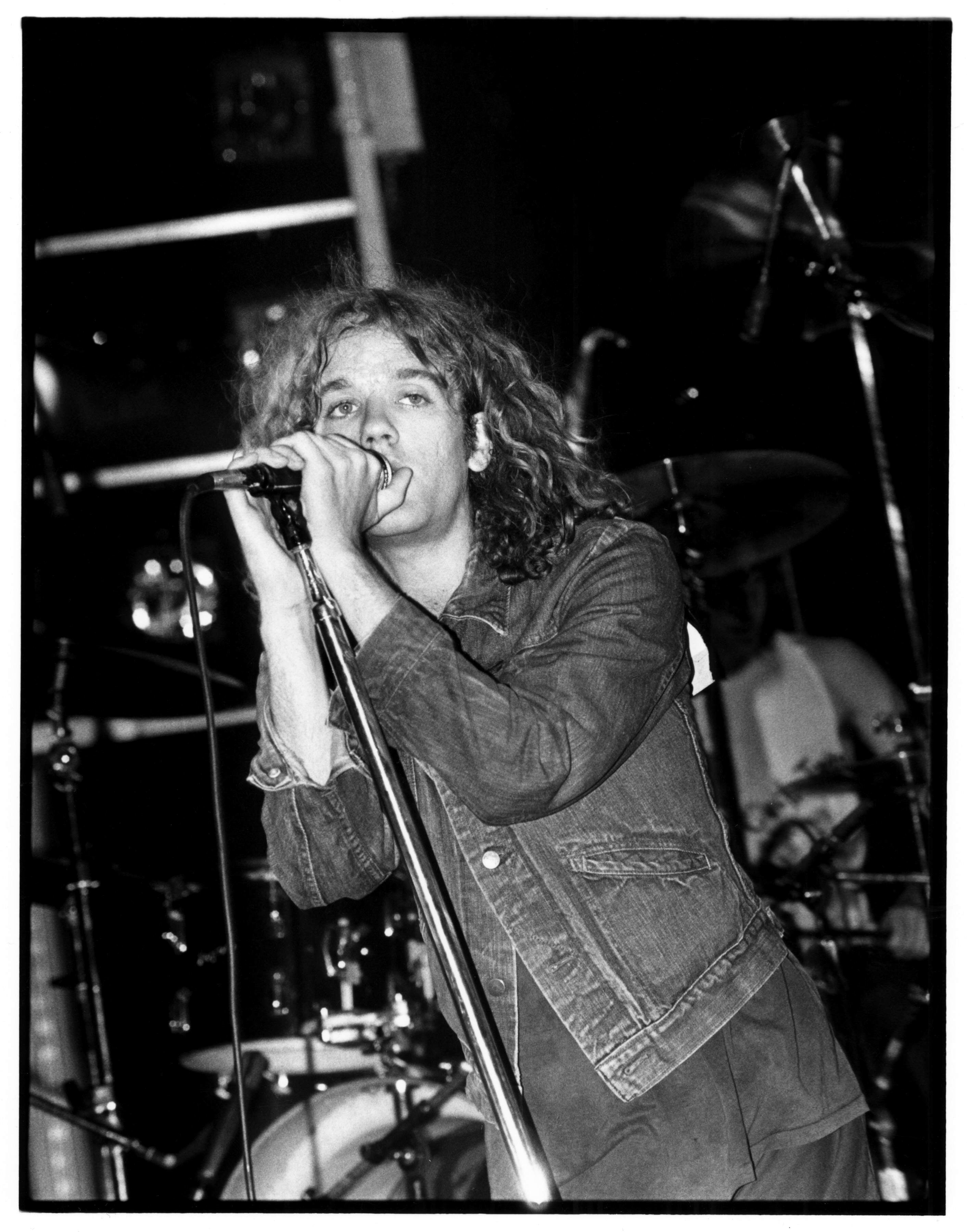 Ebet Roberts/Redferns[/caption]
Ebet Roberts/Redferns[/caption]
Just a Touch
Stipe appears to be undergoing some kind of inner conflict. He's been under the eye of anti-elitist rock 'n' rollers, but acts as if he wants to shroud himself in mystery, to stay on guard: there's his roundabout apology for wearing sunglasses like a star, his defense of his right to wear them. He's friendly, with a habit of offering the kind of information he's willing to give, but recoils from too much contact. He's like his lyrics—very specific about his impressions, but shies away from any direct exposure of his feelings. There's a sense of performance about Stipe, as if each question was there to test his creativity.
Maps and Legends
In Mike Mills's living room there's a framed "Vote Fife for Sheriff" poster ("From the Return to Mayberry film," says Mills proudly). Two feet away, The Andy Griffith Show is on a large TV. It's the only new thing in a room filled with molded fiberglass '60s chairs, a liver-shaped coffee table, and toys everywhere. After a whirlwind tour of the house, we step around boxes of records and out to Mills's van for a tour of historic Athens.
Mills tells the often-repeated story of how the band started from one party thrown at a church, then came more parties, and then their first date at a club called Tyrone's. "We opened for the Brains, another Georgia band. It was generally acknowledged that we blew 'em away." There's an undeniably boastful side to the band whenever they're discussing the group.
"That's the Richard B. Russell Agricultural Research Center," says Mills, pointing out an Athens high-rise. "That's where they tamper with the cows and mutate chickens to see what happens."
"Now look at those horses." We pass by the largest and most beautiful tawny horses I've ever seen. "They're probably mutants, too."
Sitting Still
Mills takes me to The Taco Stand, where beans and rice are 79 cents, and we talk while we eat. Although Mills is much more straightforward than Stipe, he's a lot less personal. His experience with interviews shows (he and Buck do most of the talking for the band), and his answers tend to be pat.
"I've made a little more money," he says. "I bought my house. That brings on more changes than anything that has to do with the band. We didn't have a clear idea what we were going for on Fables—we didn't have time to formulate one. We wanted this new album to be a little more focused. Some of our best stuff is on Fables, but as a whole I think it's weak. We wanted to have enough time to write good songs for this one."
"I thought Mike's voice was pretty clear on Fables. It's just that what he says is not what you expect to hear. At first, you might not follow his thought because he leaves out words that normally would be there. But if you keep listening, you can follow him. Michael's gotten a little more confident and better at it every time we record. Now we'd all like to score a movie. That would be fun. If Tangerine Dream can do it, we can."
"Both my parents worked. I grew up around lots of music. My dad is a dramatic tenor, and my mother sings and plays piano and guitar. Dad was a tenor soloist at a big church in Atlanta a few years ago. Now he sings at friends' weddings. I used to go to sleep hearing tenor arias and piano concertos. But he'd also play the Four Freshman and the Five Trombones. My brother works for his company, but he has a band together."
What would you be doing if you weren't in music?
"I think I'd be playing baseball."
https://youtu.be/x_Wz1DRuPJo
Gardening at Night
I catch up on some missed sleep and wake up to take the 10-minute walk back past the Holiday Inn to the 40 Watt Club, where I'm supposed to meet Peter Buck and see Matt "Guitar" Murphy, the classic blues and soul musician who was in The Blues Brothers. The cover is $4, down from $5 because I walk in as Murphy and his band finish their first show with "Soul Man."
The club looks like the set for a beer commercial. A big banner hangs over the bar declaring: "Budweiser Always a Dollar." Most everybody looks peaches-and-cream collegiate, except for a few still-hairy hippies, one of whom is the bartender and owner. No blacks except those in Murphy's band. No Peter Buck. But Bill Berry, R.E.M.'s drummer and sometimes songwriter, finds me and introduces me to his newlywed wife.
"Barry, meet Marry Berry."
The kids are dancing furiously, even to blues. Rap groups rarely get such an enthusiastic reaction in New York. Berry disappears. Chris takes me to R.E.M.'s rehearsal studio.
Laughing
Berry is there with Mary and Curtis Goodman, R.E.M.'s stage manager. After much dawdling, R.E.M.'s spinoff cover band the Corn Cob Webs start picking up instruments. A blues jam begins. Curtis tells me to pick up a cowbell, and I tap along. "Hey Barry," berry shouts, "you play drums!"
I warn them I haven't been behind a drum set in years. I also realize I've never played a blues beat. What would Frank Beard from ZZ Top do? Berry throws down some wild harmonica on a few nameless numbers while I struggle and have the time of my life. Afterwards, berry turns to me, pats my back several times, and says, "You were great."
What If We Give It Away?
Jim Herbert, director of R.E.M. videos such as "Pretty Persuasion" and "Driver 8" and painting teacher at the University of Georgia (where he once taught Michael), is called in as a spokesman until Peter shows up.
"My kind of filmmaking is structured similarly to their music," says Herbert. "It's romantic, layered, somewhat diffuse, and there's a certain southern ambience. I always allow a certain amount of decay and crumbling quality to the film itself. Michael's interest in primitivism, textures, and surfaces, and even the music itself, will touch on that wet underside of the board that is the South. It's a little bit squirmy and dark."
"I'll tell you something that's similar to my paintings and their music. It's the concept of continuous field as opposed to clear figure ground. Continuous field is like a Monet painting. The picture is filled with small intervals that add up to an environmental situation."
"The Whirlygig place where we filmed 'Pretty Persuasion' is like continuous field. It's thousands of repeated patterns all spinning, all going in different directions and in different textures, but they're all in intervals. Michael's lyrics are sunk back into the band's textured, layered presence like continuous field painting, as opposed to a vocalist popping out in front of the music."
[caption id="attachment_id_338525"] 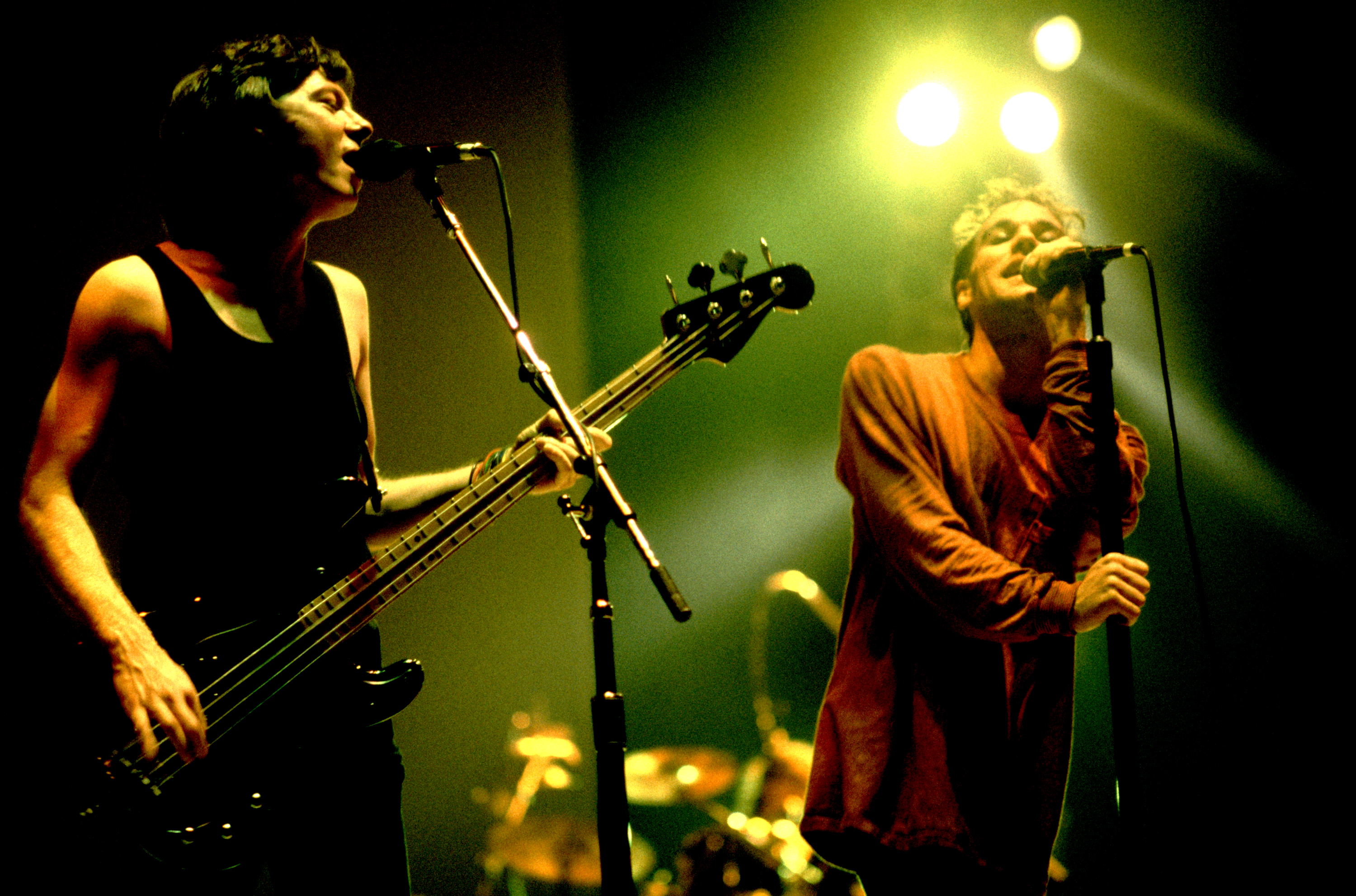 Paul Natkin/Getty Images[/caption]
Paul Natkin/Getty Images[/caption]
I think of rap and the stark sounds of L.L. Cool J and Run-D.M.C. as being music with clear figure ground, and how that music represents urban life's hard edges.
"When Michael wrote the lyrics for the Golden Palominos, he and Anton Fier's tape, and he built up the song by mumbling bits of lyrics and looking over at someone's backyard and including what he saw. His whole thing is getting into a situation, finding the things that are emblematic or symbolic, and tracing together the natural connections. He doesn't force things like a designer. He's more like an artist who finds things."
When I interviewed him, he seemed not to remember his childhood.
"Michael doesn't like to reveal obvious things. There are veils, distance, and layers around him. My image of him is very foggy. Some people accuse him of having a star aspect to his personality. There's definitely an elusiveness about him."
Stumble
Herbert's explanation is cut short by the belated entrance of Peter Buck. While the other band members look basically like regular guys, Buck's appearance has become shockingly rock star-ish. He now has long, stringy hair that reaches the shoulders of his rock-star white shirt, which is rolled up at the cuffs to reveal a rock-star knot of twine around his wrist. He's wearing black rock-star jeans and blue suede rock-star shoes. He towers above me at a lanky rock-star height. I ask about his father, who may be dying. "He's not doing too good. He's in intensive care with a very high temperature."
Buck is shaking. He squirms in his seat and answers my questions thoughtfully, but with edgy, rapid-fire replies. I really feel sorry for him and think he probably dressed that way to cheer himself up.
"Michael is so unpredictable. I'm never sure what is going to appeal to him and what isn't. He never takes the easy way, which can be pretty frustrating. But quite often his led-field suggestions make you question things you took for granted, like how songs are arranged and the decision between lead and background vocals. When we finally have a pretty good handle on the song, he tears and twists it apart so his lyrics and melody can fit in. Mike Mills has a real good ear for harmony."
"One of the things that isn't often written about us is that we're one of the most harmonically weird bands in rock 'n' roll. When I come up with a chord progression, Mike will do a bass part that has nothing to do with it but still makes sense."
https://youtu.be/mWPD1zPFZ3Q
How do you see your own contribution?
"If nothing else, I'm a big enough asshole to get everyone moving. I'm probably the most impatient and the one to yell at people. I think I have a pretty good sense of rhythm."
And Bill?
What can you say about the drummer without making him sound like just the drummer? He writes good songs, he has really neat ideas for arrangements, and he's a real tremendous drummer."
What is most important to you besides music?
[After the longest gap in conversation] "It sounds pathetic. I can't think of anything. Other than family, friends, and music, there's really nothing. I try to read things that are good for me, but I also read real crap, too. Right now I'm reading the new Iris Murdoch, The Philosopher's Pupil, which is pretty rough going. But I'm also reading Elvis and Me by Priscilla."
"I noticed over the last few months that after I make the record and tour, I'll come home to hibernate, and I don't have any contact with the real world. So I started working one day a week at Wuxtry's, the record story I used to manage. I take my pay in records."
What was your goal with Lifes Rich Pageant?
"We wanted to make more of a rock 'n' roll album. Not like Mötley Crüe, but like us. The last one was a bit too moody, and there was too much pressure on us. Now our main responsibility is ourselves. If we please ourselves, then hopefully we'll satisfy others. I would never take an endorsement from a beer company. There might come a time when we have to, there's nothing wrong with it, but I'd still feel like a whore."
Buck is very apologetic. "I feel like I haven't been making sense. I've been all nervous and discombobulated about my father. The girl I've been dating for six years broke up with me last Saturday. It's been one helluva week."
[caption id="attachment_id_338527"] 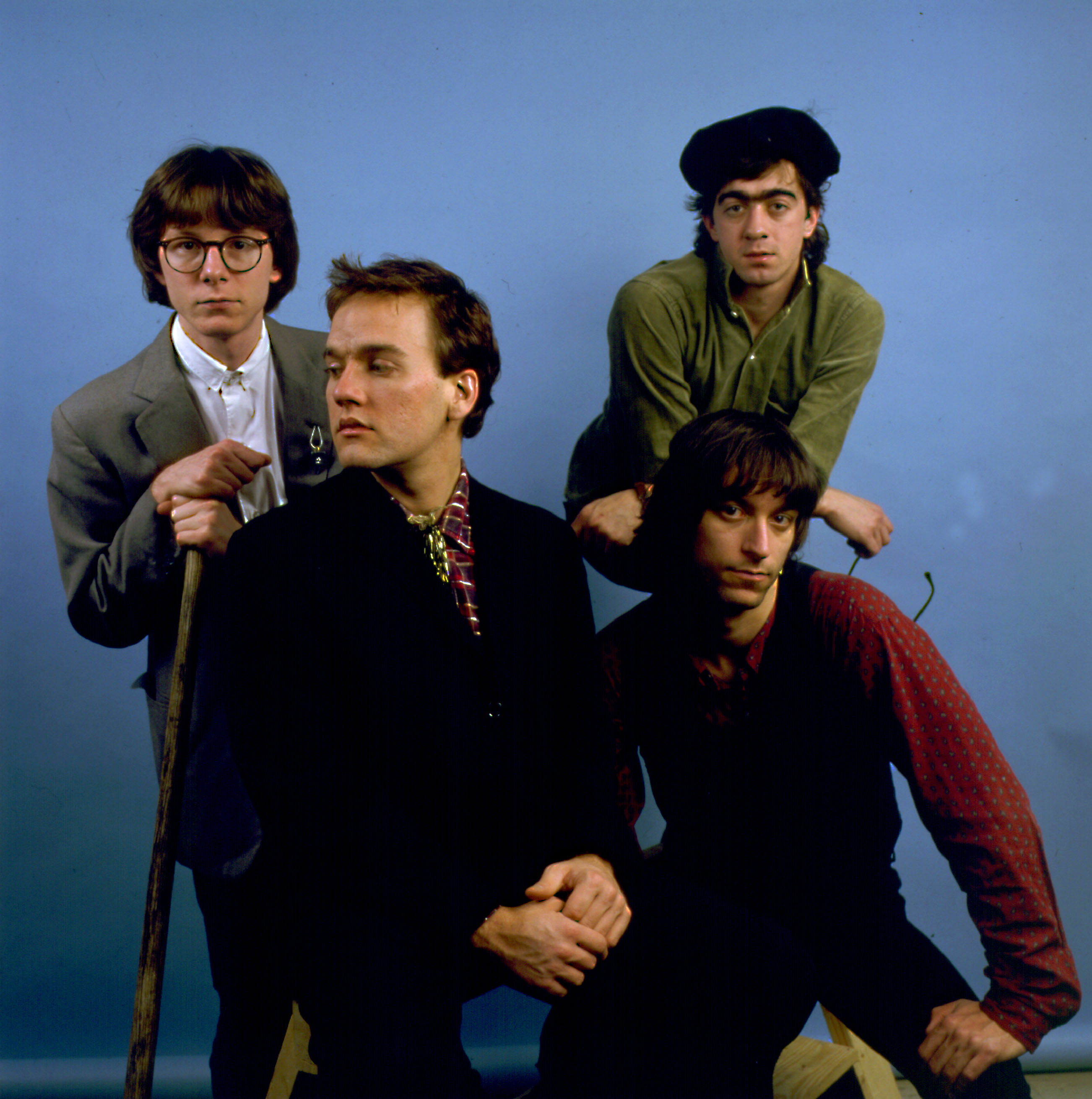 Paul Natkin/WireImage[/caption]
Paul Natkin/WireImage[/caption]
Green Grow the Rushes
The rehearsal over, Berry invites me to go fishing. It's his 28th birthday. Like the rest of R.E.M., Berry has a southern twang that only appears on certain vowel sounds, such as "away." I ask where he's from. "I wa' born in Duluth, Minnesota, home of Bobby Dylan," he kiddingly boasts. "Then I moved to Milwaukee, Wisconsin, then parts of Ohio, then Macon, Georgia, then moved to Athens in '79."
His parents moved to Macon on the town's very first day of busing. (Macon was one of the most tumultuous towns for trying out integration.) Berry obviously relishes telling stories, and I realize the animated quality of the southern voice. Whereas a northerner might raise or lower his voice for emphasis, the southern voice has a much broader pitch scale. Even though Berry's tone might not be Dixie regulation, his cadence and timing are.
I ask if he had ever found himself in a race fight. "Yeah. I was kinda interested in this black girl, and she was kinda interested in me. We would sit around the lunchroom discussing things. And it wasn't long before she suddenly stopped paying attention to me. The day after she wouldn't even talk to me, six black guys jumped me and beat me up."
How long have you known Mike Mills?
"Me and Mike were in bands together as far back as high school. We had our first apartment together. Mike was working in Sears after being a star student in high school. He was quite a bright boy. And I was working as a gofer for Ian Copeland's booking agency, which still books for us today."
"One night, over Mexican food, Mike and I decided to enroll at the University of Georgia. I wasn't motivated to do as well as I should have. And then we met Pete and Michael as a fluke to form a band. I look back on it now and I think, 'God, I'm glad I gout out of the music business.' I mean, this little spot I don't mind filling, but that's it."
What could you do if things fell apart?
"I would go back to school. I never finished. I think I now write songs well enough that I would want to write and produce for other artists. I could see myself in the artier fields, maybe photography, or the other visual arts, 'cause I have a flair for that. It is something I've thought about because here I am on my twenty-eight birthday, my hair is falling out, and I can't see myself being bald and playing drums onstage. The hair in the shower drain every morning does concern me."
https://youtu.be/l_HOabfT_3Y
Does Michael worry?
"He's pretty reckless with it. It's a different color every month, so I don't think he's too concerned."
We turn off a main road, past Carson's supermarket/gas station, where gas is "72.9 cents a gallon regular," pull into a thick wall of green with an entrance the van barely squeezes through, and drive down a dirt path. We stop and get out, and Berry reassures me, "You have nothing to worry about."
Scenes of Deliverance dance in my mind as we walk to a large pond, deserted except for a big, bizarre inflatable polka-dotted dragon. I grab a bucket full of bait and step into a small rowboat with Berry.
The acoustics of the pond are eerie. There's the hiss of crickets in the distance, but here at the center the silence is broken only by the sound of the oars slapping the water.
What direction do you think the band is going in?
Berry thinks a long time before speaking. "It's not like a progression. It goes in spurts. The last record, we were desperate for material. On this one, we were prepared. We're on a good writing streak now. I can see that we're getting little more [pause] metal. We're becoming more confident. This is the first album we played everything on."
Does Michael ever explain his lyrics?
"To us he does…a lot. With no provocation, he'll go on and on about them. To others, he's very guarded. There are brief explanations on the back of Lifes Rich Pageant's sleeve that I think make the songs mean more. Like 'Cuyahoga' is an Indian word for a river in Ohio so polluted they had to burn part of it off. And 'Fall on Me' is about acid rain."
"Sometimes people will send Michael what they think the lyrics are in the hopes that he'll tell them what they are. One time, a guy thought one of the lines in 'Sitting Still' is [singing] 'We will gather, throw up beer.' Sometimes Michael will change the lyrics to what people thought they were."
(Little does Berry know that before he quoted the "We knee skinned and river red" line from "Cuyahoga," I had assumed the lyric referred to weenie skin.)
[caption id="attachment_id_338531"] 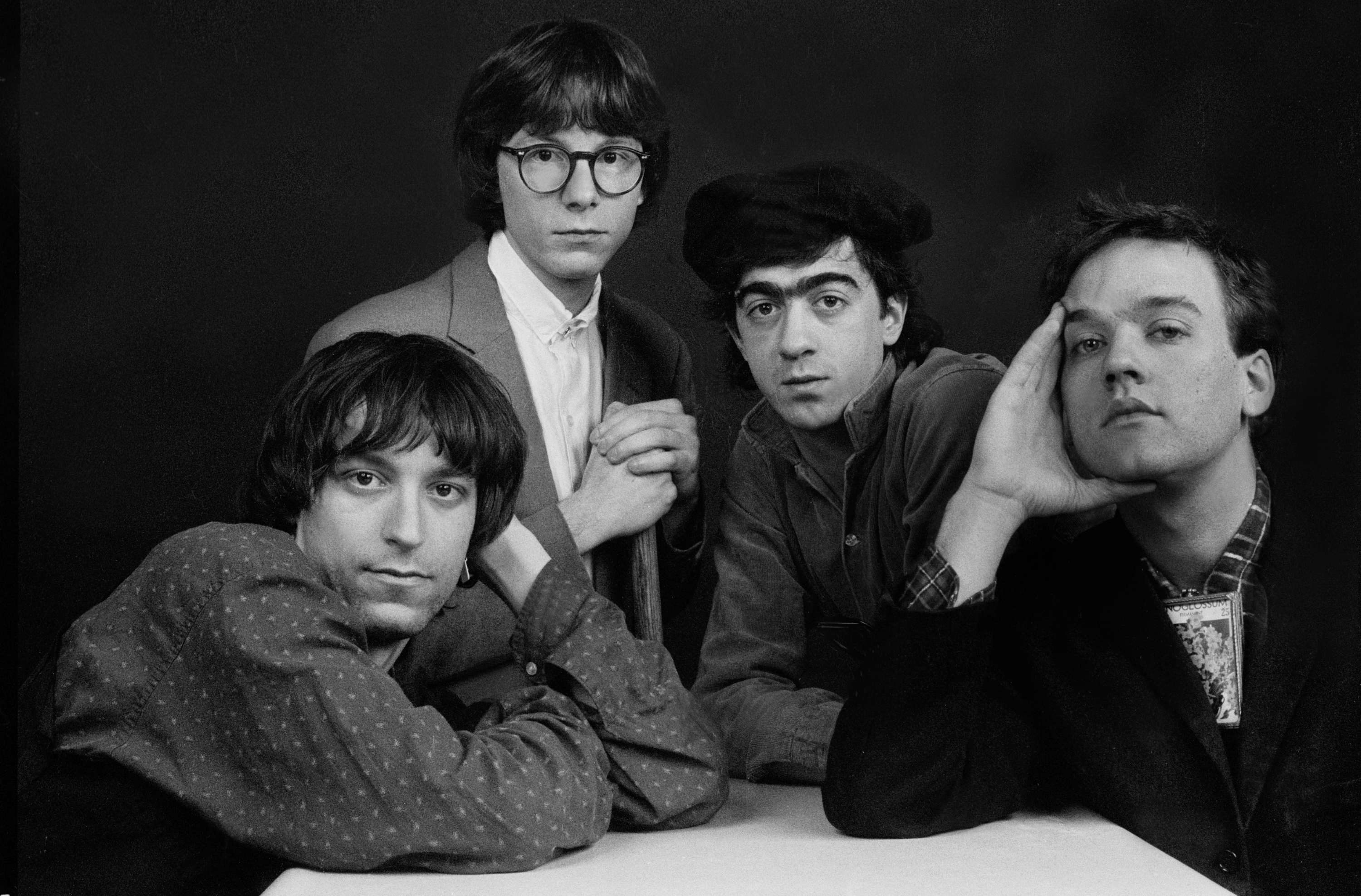 Paul Natkin/Getty Images[/caption]
Paul Natkin/Getty Images[/caption]
We get out of the boat and feed the remaining minnows to three identical tomcats that are watching us. Berry asks if I'm going to see Love Tractor tonight at the 40 Watt Club. "I love Love Tractor," he sighs. "That's the band I almost quit R.E.M. for. When they started out, they used a drum machine because they needed a drummer. This was the same time our original 'Radio Free Europe' single started getting college play. Around that time, we decided it was time either to shit or get off the pot, because we were all still in school and doing miserably. The rest of the guys were all willing to quit school, whereas Love Tractor wanted to stay in school. So I stayed with the R.E.M. boys."
Driving back to town, we talk about how great Pylon was, and Berry shares with me his recipe for boiled peanuts. "Why do you stay in Athens?" I ask.
"You've got a regular turnover of intelligent people. You're in a town large enough to have a couple of good clubs and records stores, but you can still walk from one side of the town to the other. And the myth perpetuates itself, because you've got interesting people coming in search of what they've read about."
Perfect Circle
Flight home. I listen to Lifes Rich Pagent. It balances the excitement of their earlier work with the maturity of their later, has a greater scope and better songs than before. Everything from the mix to the lyrics is just a touch more direct; the new material resonates with sensuality. You can not only hear what Stipe is saying, you can understand him, too. Stipe has lowered his defenses enough to quote Patti Smith outright and scream, "I'm so young, I'm so goddamn young." R.E.M. sound like they're finally enjoying themselves.



